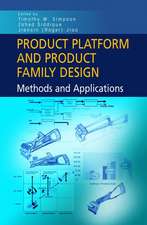Simulating Knowledge Dynamics in Innovation Networks: Understanding Complex Systems
Editat de Nigel Gilbert, Petra Ahrweiler, Andreas Pykaen Limba Engleză Hardback – 5 aug 2014
This text introduces SKIN (Simulation Knowledge Dynamics in Innovation Networks), an agent-based simulation model that primarily focuses on joint knowledge creation and exchange of knowledge in innovation co‐operations and networks. In this context, knowledge is explicitly modeled and not approximated by, for instance, the level of accumulated R&D investment. The SKIN approach supports applications in different domains ranging from sector-based research activities in knowledge-intensive industries to the activities of international research consortia engaged in basic and applied research.
Following a general description of the SKIN model, several applications and modifications are presented. Each chapter introduces in detail the structure of the model, the relevant methodological considerations and the analysis of simulation results, while options for empirically validating the models’ structure and outcomes are also discussed. The book considers the scope of further applications and outlines prospects for the development of joint modeling strategies.
| Toate formatele și edițiile | Preț | Express |
|---|---|---|
| Paperback (1) | 638.76 lei 43-57 zile | |
| Springer Berlin, Heidelberg – 23 aug 2016 | 638.76 lei 43-57 zile | |
| Hardback (1) | 644.95 lei 43-57 zile | |
| Springer Berlin, Heidelberg – 5 aug 2014 | 644.95 lei 43-57 zile |
Din seria Understanding Complex Systems
- 18%
 Preț: 1112.30 lei
Preț: 1112.30 lei -
 Preț: 439.25 lei
Preț: 439.25 lei - 18%
 Preț: 1119.38 lei
Preț: 1119.38 lei - 15%
 Preț: 401.82 lei
Preț: 401.82 lei - 18%
 Preț: 1247.26 lei
Preț: 1247.26 lei - 15%
 Preț: 641.20 lei
Preț: 641.20 lei - 15%
 Preț: 642.68 lei
Preț: 642.68 lei - 15%
 Preț: 651.51 lei
Preț: 651.51 lei - 18%
 Preț: 946.55 lei
Preț: 946.55 lei - 18%
 Preț: 947.98 lei
Preț: 947.98 lei - 20%
 Preț: 650.27 lei
Preț: 650.27 lei - 18%
 Preț: 952.09 lei
Preț: 952.09 lei - 18%
 Preț: 957.13 lei
Preț: 957.13 lei - 18%
 Preț: 943.88 lei
Preț: 943.88 lei -
 Preț: 398.35 lei
Preț: 398.35 lei - 5%
 Preț: 1417.54 lei
Preț: 1417.54 lei - 15%
 Preț: 648.42 lei
Preț: 648.42 lei -
 Preț: 387.75 lei
Preț: 387.75 lei - 18%
 Preț: 1133.76 lei
Preț: 1133.76 lei - 18%
 Preț: 948.16 lei
Preț: 948.16 lei - 20%
 Preț: 655.85 lei
Preț: 655.85 lei - 18%
 Preț: 1113.09 lei
Preț: 1113.09 lei - 20%
 Preț: 655.53 lei
Preț: 655.53 lei - 15%
 Preț: 653.00 lei
Preț: 653.00 lei - 18%
 Preț: 1392.77 lei
Preț: 1392.77 lei - 18%
 Preț: 1010.48 lei
Preț: 1010.48 lei - 18%
 Preț: 955.56 lei
Preț: 955.56 lei -
 Preț: 384.22 lei
Preț: 384.22 lei - 18%
 Preț: 950.66 lei
Preț: 950.66 lei - 15%
 Preț: 638.43 lei
Preț: 638.43 lei - 15%
 Preț: 644.49 lei
Preț: 644.49 lei - 15%
 Preț: 647.40 lei
Preț: 647.40 lei - 15%
 Preț: 649.06 lei
Preț: 649.06 lei - 15%
 Preț: 639.25 lei
Preț: 639.25 lei - 15%
 Preț: 643.65 lei
Preț: 643.65 lei - 18%
 Preț: 960.78 lei
Preț: 960.78 lei - 15%
 Preț: 649.87 lei
Preț: 649.87 lei - 15%
 Preț: 645.47 lei
Preț: 645.47 lei
Preț: 644.95 lei
Preț vechi: 758.77 lei
-15% Nou
Puncte Express: 967
Preț estimativ în valută:
123.41€ • 129.18$ • 102.72£
123.41€ • 129.18$ • 102.72£
Carte tipărită la comandă
Livrare economică 31 martie-14 aprilie
Preluare comenzi: 021 569.72.76
Specificații
ISBN-13: 9783662435076
ISBN-10: 3662435071
Pagini: 260
Ilustrații: XII, 248 p. 71 illus., 37 illus. in color.
Dimensiuni: 155 x 235 x 20 mm
Greutate: 0.54 kg
Ediția:2014
Editura: Springer Berlin, Heidelberg
Colecția Springer
Seria Understanding Complex Systems
Locul publicării:Berlin, Heidelberg, Germany
ISBN-10: 3662435071
Pagini: 260
Ilustrații: XII, 248 p. 71 illus., 37 illus. in color.
Dimensiuni: 155 x 235 x 20 mm
Greutate: 0.54 kg
Ediția:2014
Editura: Springer Berlin, Heidelberg
Colecția Springer
Seria Understanding Complex Systems
Locul publicării:Berlin, Heidelberg, Germany
Public țintă
ResearchCuprins
Introduction: SKIN modeling.- Part 1 Innovation Strategies.-Part 2 Testing Policy Options.- Part 3 Applying SKIN to innovation sectors.- Summary and Outlook.
Textul de pe ultima copertă
The competitiveness of firms, regions and countries greatly depends on the generation, dissemination and application of new knowledge. Modern innovation research is challenged by the need to incorporate knowledge generation and dissemination processes into the analysis so as to disentangle the complexity of these dynamic processes. With innovation, however, strong uncertainty, nonlinearities and actor heterogeneity become central factors that are at odds with traditional modeling techniques anchored in equilibrium and homogeneity.
This text introduces SKIN (Simulation Knowledge Dynamics in Innovation Networks), an agent-based simulation model that primarily focuses on joint knowledge creation and exchange of knowledge in innovation co‐operations and networks. In this context, knowledge is explicitly modeled and not approximated by, for instance, the level of accumulated R&D investment. The SKIN approach supports applications in different domains ranging from sector-based research activities in knowledge-intensive industries to the activities of international research consortia engaged in basic and applied research.
Following a general description of the SKIN model, several applications and modifications are presented. Each chapter introduces in detail the structure of the model, the relevant methodological considerations and the analysis of simulation results, while options for empirically validating the models’ structure and outcomes are also discussed. The book considers the scope of further applications and outlines prospects for the development of joint modeling strategies.
This text introduces SKIN (Simulation Knowledge Dynamics in Innovation Networks), an agent-based simulation model that primarily focuses on joint knowledge creation and exchange of knowledge in innovation co‐operations and networks. In this context, knowledge is explicitly modeled and not approximated by, for instance, the level of accumulated R&D investment. The SKIN approach supports applications in different domains ranging from sector-based research activities in knowledge-intensive industries to the activities of international research consortia engaged in basic and applied research.
Following a general description of the SKIN model, several applications and modifications are presented. Each chapter introduces in detail the structure of the model, the relevant methodological considerations and the analysis of simulation results, while options for empirically validating the models’ structure and outcomes are also discussed. The book considers the scope of further applications and outlines prospects for the development of joint modeling strategies.
Caracteristici
Edited and authored by leading researchers in the field Self-contained introduction into a new and well-tested modelling technique Contains case studies









![Using Hoshin Kanri to Improve the Value Stream [With CDROM]: From Theory to Practice](https://i3.books-express.ro/bt/9781420084238/using-hoshin-kanri-to-improve-the-value-stream-with-cdrom.jpg)





